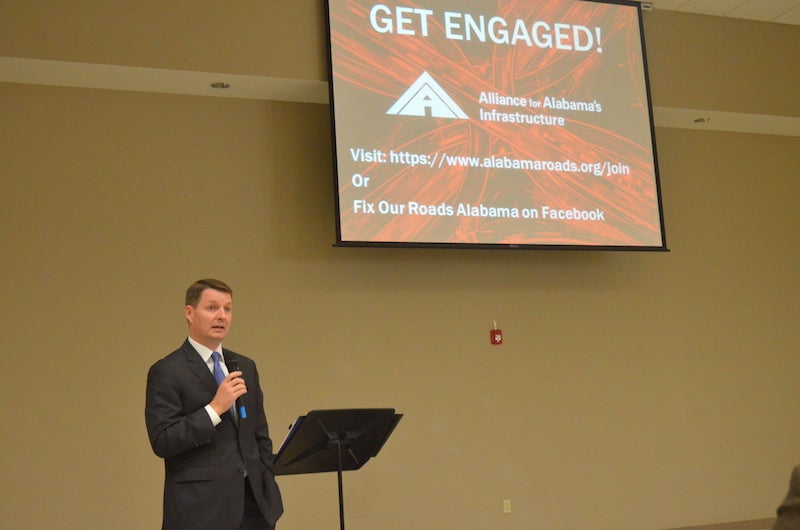Roads, bridges discussed at first Shelby County Chamber event
Published 4:10 pm Friday, January 11, 2019

- Jim Page, chairman of the Alliance for Alabama’s Infrastructure, speaks at The Shelby County Chamber Connections Luncheon on Thursday, Jan. 10. (REPORTER PHOTO/STEPHEN DAWKINS)
COLUMBIANA –Roads and bridges are critical to Alabama’s economic development, and the quality of life and safety of residents, Jim Page with the Alliance for Alabama’s Infrastructure said at The Shelby County Chamber Connections Luncheon on Thursday, Jan. 10.
The AAI advocates for the state investing in infrastructure, attendees learned at the first event held by The Shelby County Chamber, which resulted from the merger of the Greater Shelby and South Shelby chambers of commerce.
“We have Alabamians who die on our roadways every day from faulty road issues, and that’s something that can be fixed,” Page said.
Some statistics Page shared included:
- Highway accessibility is the most important factor when corporate executives select a new site, according to a study.
- The Federal Highway Administration has projected that every $500 million invested in transportation infrastructure supports 14,000 new jobs.
- Seven Southeastern states that compete with Alabama for new business have higher levels of funding for roads and bridges.
- Alabama roads received a “D+” grade in a 2015 report, which found that 19 percent of major state-maintained roads are in poor condition.
- There are 1,200 structurally deficient bridges and 2,447 weight restricted bridges in Alabama.
- Twenty-one percent of Alabama’s interstates and freeways are congested.
- County governments are operating on a 186-year bridge replacement schedule (should be 50 years) and a 56-year county road resurfacing schedule (should be 15 years).
- More than 2,000 traffic fatalities occurred on Alabama roadways from 2016-2017, and an estimated one-third of those fatalities were the result of roadway features.
- The Federal Highway Administration has projected that every $500 million invested in transportation infrastructure results in 725 fewer traffic fatalities every 10 years.
- In 2016, Alabama ranked second in the nation on a per capita basis for the number of traffic fatalities on its roadways.
- $4.2 billion is the total cost to Alabama motorists for driving on deficient roads in the form of additional vehicle operating costs, congestion-related delays and traffic crashes.
Alabama has the fifth-lowest gas tax rate in the country at a flat rate of 18 cents per gallon, which was last increased in 1992.
The fuel tax is Alabama’s primary revenue source for transportation funding at about 80 percent.
Meanwhile, Alabama county governments face an annual shortfall of $190 million in funding local road and bridge maintenance projects. Also, $390 million is the minimum amount needed annually to expand Alabama’s most congested roadways.
Increased fuel efficiency has delivered a blow to road and bridge funding because vehicles can now travel farther using less gas, meaning fewer stops at the gas station to pay the state’s road-user fee. At the same time, inflation and increasing construction costs have further stressed the system.
A poll showed 59 percent of Alabamians are in favor of increasing the gas tax if accountability measures were in place.
“We have got to know where the money is going,” Page said.
“There are a lot of people who don’t want to do this, who don’t want to invest in this, and my answer to them is the cost of not doing this is not zero,” Page said and added that a motto used by the Alliance is “The more we delay, the more we pay.”









